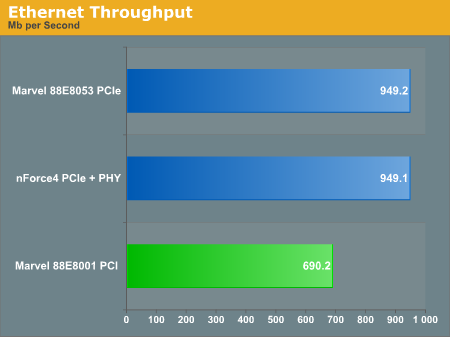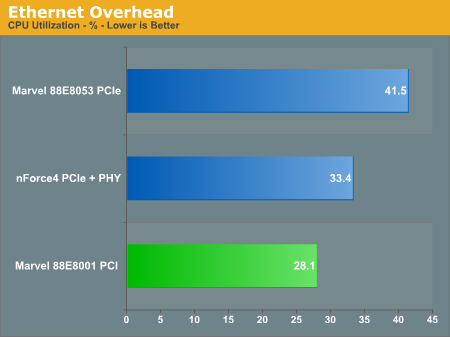nForce4 Ultra Roundup: Charting the Mainstream
by Wesley Fink on July 5, 2005 10:28 PM EST- Posted in
- Motherboards
Ethernet Performance
We have often talked about the throughput advantage of PCI Express compared to PCI and its impact on Gigabit LAN performance. To show you this, the new motherboard test suite includes LAN performance measurements.The Windows 2000 Driver Development Kit (DDK) includes a useful LAN testing utility called NTttcp. We used the NTttcp tool to test Ethernet throughput and the CPU utilization of the various Ethernet Controllers used on the nForce4 Ultra motherboards.
We set up one machine as the server; in this case, an Intel box with an Intel CSA Gigabit LAN connection. Intel CSA has a reputation for providing fast throughput and this seemed a reasonable choice to serve our Gigabit LAN clients. At the server side, we used the following Command Line as suggested by the VIA whitepaper on LAN testing:
Nttcps - m 4,0,On the client side (the motherboard under test), we used the following Command Line:-a 4 - l 256000 - n 30000
Nttcpr - m 4,0,At the conclusion of the test, we captured the throughput and CPU utilization figures from the client screen.-a 4 - l 256000 - n 30000


All Ethernet tests were performed with standard frames, but Gigabit Ethernet supports Jumbo frames as well. Jumbo frames will theoretically provide a further reduction in CPU overhead. We have seen test results that show the combination of Active Armor and Jumbo Frames can reduce CPU utilization below 10%, which is very respectable performance for on-chip gigabit LAN.










75 Comments
View All Comments
tribbleva - Tuesday, December 20, 2005 - link
Every single one of these MBs has a fan on the NB... where are the passively cooled mobos? The last thing I want is one or TWO more tiny fans just on the mobo to worry about failing...Zebo - Friday, July 22, 2005 - link
"someof you take Anandtech's word as the word of GOD"It's as close as you can get without dying.:)
Zebo - Friday, July 22, 2005 - link
Viper - You should come inside the forums for specfic help..dg3274 - Saturday, July 16, 2005 - link
The article states that the Abit board has a problem with 1:1 overclocking. I disagree. I think the problem is that it does not provide enough ram voltage to run the RAM at high 1:1 FSB. 2.8 volts is not enough to run ANY ram much higher than 280 or so FSB.Viper4185 - Thursday, July 14, 2005 - link
No one wants to help me with my n00b questions :(Marcel - Tuesday, July 12, 2005 - link
#67 I must be a little a slow …In the test “Maximun CPU Clock ( Lower Multiplier )”
For Chaintec, Abit, etc you use the multiplier in “11”, and only for Epox and DFI you use the multiplier in “9”, then you show a diagram with nothing more than the fsb.
http://images.anandtech.com/graphs/nf4%20ultra%20r...
The first question is WHY ?? there is no explanation for use different multiplier in the review. Not some guys, but ALL ones have better result in chaintec and abit with a lower multiplier.
TheGlassman - Monday, July 11, 2005 - link
Thanks Wesley, I did find you had checked HTT, and as I stated in my last post I don't understand what the problem was. But the deeper I looked into the review, the better job you seemed to have done, so sorry if I impied you didn't try very hard.DFI has a dual core (beta) bios available, dated 6-23-05
Epox has a dual core (release) bios available, dated 6-29-05
These were not used in testing.
Wesley Fink - Monday, July 11, 2005 - link
#59 and #60 - One of the first articles I did a couple of years ago about Athlon 64 was how to overclock by manipulating HTT frequencies. I ALWAYS test manual HTT dividers I know should work for certain 1:1 memory clocks as well as Auto HTT if it is an available option.#58 - I was very CLEAR in the review that I tested with the BIOS that would allow the X2 A64 to work. We did check each board with an X2. That is the ONLY reason we tested and used very recent Beta BIOS'. Also there are 2 other very recent Chaintech reviews at other websites who had test results almost equal to what I found on the Chaintech, so there are at least 2 other Chaintechs loose with less than stirring overclocking. In the end, as I stated in the review, the Chaintech is a decent board, but at about the same price as the Epox, with poorer overclocking results, it was hard to give it an Editor's Choice this time around. The results found in this roundup should remove anyone's concern that we get cherry boards from manufacturers. I am a good overclocker, and very experienced in air overclocking and memory overclocking. What I got from these boards on air is all they could do with the TCCD memory that is all but standard test memory for motherboards these days. The capabilities of the memory we used is also well known and I tweaked for TCCD if settings were available if the board was not doing well at stock memory settings and our normal test timings.
I am really pleased some of you experienced better performance than I did with the Chaintech and Abit boards, but I can only report what I actually found in my tests. I don't think you come to AnandTech for a survey of what other websites or Forums found, because I find overclockers are notorious at exagerrating what they can reach with overclocks. We try to provide a consisten test environment for overclocking that will give repeatable overclocking results. Results, of course, always vary board to board, but having said that, OC results are usually pretty consistent on better boards from sample to sample.
lefenzy - Saturday, July 9, 2005 - link
Sorry, wrong link. that one was for the SLI version.http://www.foxconnchannel.com/productsDownload_mot...
lefenzy - Saturday, July 9, 2005 - link
Foxconn has a BIOS release that allow for multiplier adjustment.http://www.foxconnchannel.com/productsDownload_mot...